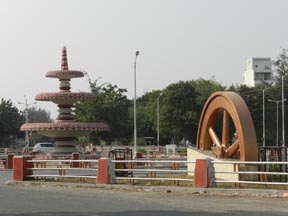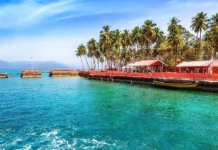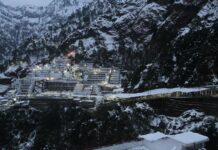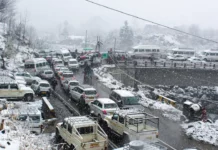 Famous as birthplace of Mahatma Gandhi
Famous as birthplace of Mahatma Gandhi
Porbandar is situated along the Arabian Sea in the western Indian state of Gujarat. Famous as the birthplace of Mahatma Gandhi, the city is well connected to the other parts of the country by rail, road, and air.
Best time to visit: The climate of Porbandar is generally pleasant. The summer season continues from March to June with the daytime temperature crossing 42ºC. The monsoons enter this region in July and remain there till September.
Winter comes in from October and stays till February. Due to the cyclonic storms or depressions in the Arabian Sea in the post monsoon months, and to a lesser extent in May and June, the city faces strong winds, heavy rain, and occasional thunderstorms. The summer temperature ranges between 24ºC and 42ºC and the winter temperature range from 10ºC to 24ºC.
History: Porbandar was a historic port of the Jetwa Rajputs, a dynasty that ruled vast areas of the Kathiawad peninsula for approximately 2000 years. After facing defeat at the hands of the Jadeja Rajputs in the late 16th and early 17th centuries, the Jetwas came back to power in the 1630s.
They shifted their capital from Ranpur to Chaya during that time and by the 18th century, the Jetwas finally settled in Porbandar, which occupied a unique position as a port city. It was strategically situated south of the ports of Nawanagar and the Kutch state, and north of Veraval in Junagadh state.
The Walker Treaty in the early 19th century brought peace in Saurashtra and this was the time of development for Porbandar. The period saw the construction of a fresh water reservoir, separate schools for boys and girls, a post office. The old fort walls were pulled down to enlarge the city and a town hall, railway station, light house and Jubilee Bridge were constructed.
The Gandhi family were the hereditary Diwans of Porbandar. On October 2, 1869, Karamchand Gandhi had a son, Mohandas Karamchand Gandhi or Mahatma Gandhi as he later came to be known the world over. But Mahatma Gandhi was not the only mahatma associated with Porbandar. Swami Vivekanand had done much of his research in Porbandar, and Rabindranath Tagore visited the city for a considerable period in 1923.
Tourist attractions
The Huzoor Palace is a massive structure like a European mansion, sprawling, with a large garden at the edge of the sea. The palace has various wings in a zigzag formation, which created space for numerous forecourts and rear courtyards, which were used for gardens and fountains. The structure is of a very modern style, crowned by trussed timber roofs and balustraded terraces offering a fabulous view of the beach and the sea. Semi-circular porticoes on neo-classical pillars offer entry to the palace from different sides.
A short walk from the Huzoor Palace leads to Daria Rajmahal, Probandar’s sea facing city palace, built in a style that blends Arabic, Indian, Gothic, and Renaissance architecture. The entrance is through a Gothic style archway, crowned by a tall tower that offers a marvelous view of the palace courtyards, the beach beyond, and the sea. Nothing remains of the Darbar hall now, and the palace has been turned into a college.
The mid 19th century Haveli of the Gandhi family has three stories around a courtyard with a kitchen, 17 rooms and a wooden shrine. Next to the Haveli is the Kirti Mandir, built in 1950 by Nanaji Bhai Kalidas as a memorial to Mahatma Gandhi. This monument has paintings of the Mahatma and his wife Kasturba. There is a moving photographic and pictorial display of the life of the Mahatma and his part in the struggle for India’s freedom, a library of books related to the Mahatma’s life and philosophy.
Walking down from Kirti Mandir one comes to Darbargadh Palace, built in 1784 by Maharana Sartanji in the typical wood and stone carved style of Gujarat. A greater example of the architecture of this period is the Grishmabhuvan, a pleasure pavilion with impressive domes, exquisite pillars and delicate arches, set in a pleasant garden. This pavilion, called Sartanji Choro because of its four part representing different seasons, was Sartanji’s refuge from the crowds of Porbandar.
Porbandar is a paradise for bird watchers. Great flocks of flamingoes, both greater and lesser, can be seen at a remarkably close range around the coastal marshes.
There are a number of lakes around Porbandar. Two of them, Jolingkong and Anchherital are situated at a height of 4,634 meters and 3,658 meters, respectively. Some beautiful old temples are also scattered around the district. A visit to the shrine at Purnagiri, 20 kilometers from Tanakpur, is believed to lead to fulfillment of one’s wishes. There is also a Sikh shrine near Lohaghat called Ritha Sahib, associated with the visit of Guru Nanak. It is believed that the bitter ritha turned sweet after the touch of the Guru.
The white Manu temple is also an oft visited site. In it is enshrined a powerful goddess known to bring rain to these mountains if properly invoked. There is also a large swing erected on the field at the base of a flight of steps leading to the temple. Here the goddess and her sister from a distant temple swing playfully when the other goddess comes visiting. No one can see them, but the swing moves!
Places around
Kuchdi is a 20-minute drive away from the city center. The place has a bird sanctuary and is quite popular with bird lovers and photographers.
Ghumli was the capital of the Jetwas long before they moved to Porbandar. The place is famous for its Naulakha temple, considered to be the oldest sun temple in India built around the 8th century, and the 12th century Vikia Vav (step well), with numerous flights of steps and string coursed carvings.
Gope, 50 km northeast of Porbandar has a 6th century temple with a sanctuary on a platform and the usual pyramidal shikhara roof. The temple is in a terribly dilapidated condition but is important, as it is one of the first to have a roof of this design.
A 30-minute drive from Porbandar takes one to Barda Hills covered with forests where one can find the Khambala Dam with its intricate, decorated kiosks.
Fairs & festivals: Along the coast at Madhavpur near Porbandar, the Madhavrai Fair is held in the month of Chaitra (March/April) to celebrate Lord Krishna’s elopement with Rukmini.
How to reach
Air – Gujarat Air connects Porbandar with Ahmedabad. From Ahmedabad, one can take flights to other important cities of India such as Delhi and Mumbai.
Rail – Porbandar is a railway station and is connected to many places in Gujarat and western India. The Saurashtra Express links Porbandar with Mumbai.
Road – Luxury bus services to Rajkot, Jamnagar, Ahmedabad, Junagadh etc. from Porbandar can be arranged.






